New Crib Safety Standards Ban Sales of Drop-Sides
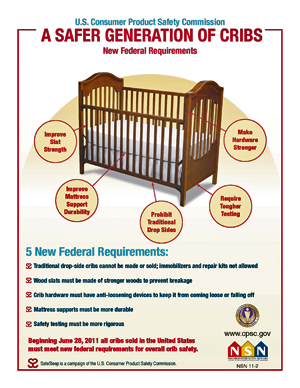 The Consumer Product Safety Commission (CPSC) has implemented comprehensive new safety standards for baby cribs. The standards ban the sale of dangerous drop-side cribs and improve safety testing to prevent infant strangulation deaths.
The Consumer Product Safety Commission (CPSC) has implemented comprehensive new safety standards for baby cribs. The standards ban the sale of dangerous drop-side cribs and improve safety testing to prevent infant strangulation deaths.
The regulations took effect this week after the recall of over 11 million unsafe cribs since 2007. Over the past decade, at least 32 infants have suffered suffocation and strangulation deaths in defective baby cribs.
The CPSC is calling the new regulations the “most stringent crib safety standards in the world.” The standards are important for parents to learn because the CPSC reports that even cribs without drop-sides are unlikely to meet the new standards.
The standards work to prevent infant deaths in several ways. In addition to banning the manufacturing or sale of drop-side cribs, the standards strengthen mattress supports and crib slats, make testing more rigorous and require crib hardware to have anti-loosening devices.
All importers, distributors, manufacturers and retailers must comply with the regulation immediately. Many large retailers such as Target and Walmart say they have already stopped selling drop-side cribs.
Certain businesses using cribs have a grace period for compliance: in-home child care services, child care facilities, rental companies and public accommodations such as hotels.
The CPSC said parents who want to keep using drop-side cribs can contact their manufacturer and ask if they offer an immobilizer. These devices secure drop-sides to prevent the crib from separating and causing an infant injury.
Parents with other types of cribs are urged to check their cribs as well. One of the reasons other cribs are unlikely to comply is the new standards require stronger wood and other materials. Parents who continue to use their existing cribs are urged to monitor recalls on the CPSC website at www.cpsc.gov.
Read More
Food Poisoning Warning for Fourth of July Cookouts
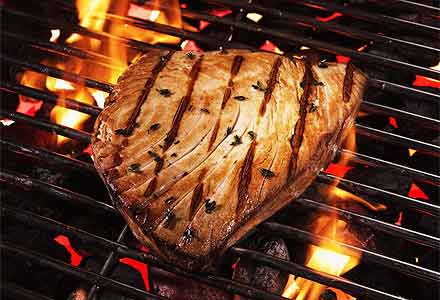 The Fourth of July is for outdoor family barbecues. But enjoying food safely in the warm weather requires planning. Each year, 48 million Americans are sickened by food poisoning – or one in six, according to the Centers for Disease Control. Of these, 180,000 are hospitalized and 3,000 die. The good news is food poisoning is preventable. If you are grilling for family and friends this holiday weekend, follow these few easy guidelines to keep your meal safe:
The Fourth of July is for outdoor family barbecues. But enjoying food safely in the warm weather requires planning. Each year, 48 million Americans are sickened by food poisoning – or one in six, according to the Centers for Disease Control. Of these, 180,000 are hospitalized and 3,000 die. The good news is food poisoning is preventable. If you are grilling for family and friends this holiday weekend, follow these few easy guidelines to keep your meal safe:
- Wash your hands thoroughly with soap and water before and after handling food. Washing hands afterward is just as important to prevent food poisoning.
- Make hand soap accessible indoors. Outdoors, keep hand sanitizer near your food. Encourage everyone cooking and eating to use it.
- Limit the amount of time food is left outside, especially mayonnaise-based salads.
- Marinate meats and other foods in the refrigerator, never on the counter.
- Never reuse sauce used to marinate raw meat, poultry or seafood. If you want to use the sauce in another way, set aside a separate portion before marinating.
- Use a food thermometer to make sure food is cooked thoroughly. Refer to the Safe Minimum Temperatures Chart for safe internal temperatures.
- Serve food at a safe temperature. Keep hot food at 140 degrees Fahrenheit or above until served. Serve cold food at 40 degrees Fahrenheit.
- Make sure to keep plenty of ice and coolers on hand. Maintain one cooler for beverages and one for raw meats, poultry and seafood. Keep a third cooler for cooked foods and raw fruits and vegetables.
Grill Safely This Independence Day
 As families across the country celebrate Independence Day this weekend, many will enjoy tasty barbeques.
As families across the country celebrate Independence Day this weekend, many will enjoy tasty barbeques.
Family gatherings should be fun, but grilling can be dangerous without proper safety precautions. Each year, an estimated 3,800 people in the U.S. are treated in emergency rooms for burns, carbon monoxide poisoning and other injuries related to grilling, according to the Consumer Product Safety Commission (CPSC).
Grill safely with our tips for your holiday cookout:
- At the start of each season, inspect a gas grill’s hoses for signs of cracking, holes and evidence of animal bites or insects. Replace damaged parts.
- Make sure the grill is clean before using. Regularly clean it throughout the season as described in the owner’s manual.
- Always use grills outside.
- Never leave a grill unattended.
- Keep children away from the grill area. The outside surface of a grill can burn a children’s hands.
- If a grease fire occurs, turn off the gas grill and use baking soda or a fire extinguisher to put out the blaze.
- Never store or use flammable liquids such as gasoline near a grill.
- Check the CPSC website to make sure you are not using a recalled grill.
Charcoal Grill Safety
- There are several ways to start a charcoal grill, including starter fluid, charcoal chimney starters and electric charcoal starters. Choose one method and become knowledgeable about it before starting your grill.
- If you use a starter fluid, use only charcoal starter fluid. Never add charcoal fluid or any other flammable liquids to the fire.
- Store charcoal starter fluid out of reach of children and away from heat sources.
- When you are finished grilling, let the charcoals completely cool before disposing them in a metal container.
Propane Tank Grilling Safety
- Transport your propane tank to the refill station or hardware store in a standing position. Use a box or order a special carrying case. Do not let passengers hold the tank. Do not do other errands when you are getting your propane tank filled.
- Never take a propane gas tank inside the refill facility or your home because of the risk for a gas explosion.
- Be sure the propane tank valve is closed when you disconnect it from the grill. Newer propane tanks have a safety device that will prevent gas flow from the tank when it is disconnected. But it is still a good idea to make sure the valve is closed.
- When you connect your propane tank to your grill, if you see fog or smell gas, it is a sign of a leak. This means there is a risk for a gas explosion. Stop what you are doing, move your family away from the property and contact your local fire department.
- Another way to test for a propane tank leak before each season is to open the gas supply valve fully. Apply a soapy solution with a brush at the connection point. If bubbles appear, there is a leak. Try tightening the tank’s connection to see if the leak stops or contact a qualified gas professional.
Massachusetts Court Rules Against Insurer in Bad Faith Case – Victory for Consumers
The Massachusetts Appeals Court recently ruled that Metropolitan Property and Casualty Insurance Company may have violated state law when it failed to make prompt payments on a no-fault claim. The ruling reversed a trial court decision, and remanded the matter to the trial court for further proceedings on the plaintiff’s claims against the insurance company for bad faith.
Importantly, the court stated that the emotional distress the plaintiff claims she suffered could be considered as part of her damages under the Consumer Protection Act, M.G.L. c. 93A. There is very limited authority in Massachusetts for emotional distress damages in claims under M.G.L. c. 93A.
The facts of the case were straightforward. Ms. Chery was injured in a car accident and obtained medical treatment. Metropolitan was responsible for personal injury protection (PIP) benefits, but failed to pay the bills within thirty days, as required by M.G.L. c. 90, Sec. 34M. The plaintiff filed suit, claiming violations of c. 90, c. 93A, and c. 176D, which governs claims and settlements. The insurance company eventually paid the bills, then claimed it could not be liable for its bad faith claims handling. The District Court judge agreed and plaintiff appealed.
The Appeals Court agreed that the claimant had no further right under the insurance contact itself, as the bills had been paid. However, the court found that there was evidence of bad faith, and the simple payment of the bills did not cure the harm caused by the delay. Among other things, the plaintiff had to file suit, incur litigation expenses, and suffer the unreasonable delay. The plaintiff also claimed that she suffered emotional distress, as her bills were put into collection, and she worried about her credit being affected. The court specifically ruled that the emotional distress damages, even though not readily quantifiable, may be considered compensable under Massachusetts law.
The case was a victory for Massachusetts consumers.
The case is Chery v. Metropolitan Property and Casualty Insurance Company, Massachusetts Appeals Court No. 10-P-103 (June 16, 2011).
We Help Consumers Who Have Been Injured by the Bad Faith of Insurance Companies
Our firm has a long history of helping consumers with claims against Massachusetts insurance companies for bad faith settlement practices. Massachusetts law can be quite favorable for consumers when an insurance company fails to settle a case when liability is reasonably clear. The court may award up to triple damages, depending on the circumstances of the case.
Please feel free to contact us if you have any questions about claims against insurance companies. Our toll free number is 800 379 1244.
Product Recall: Bunk Beds from Big Lots
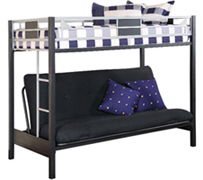 A popular bunk bed set is being recalled after a three-year-old boy became entrapped in the frame and died due to asphyxiation.
A popular bunk bed set is being recalled after a three-year-old boy became entrapped in the frame and died due to asphyxiation.
Big Lots of Columbus, Ohio is recalling 30,000 metal futon bunk beds sold at its stores nationwide from January 2009 through April 2010 for about $200.
The recalled beds have a convertible futon bed on the bottom with a metal ladder leading up to a twin-sized bed. The Consumer Product Safety Commission (CPSC) warns parents that children behind the futon or in the ladder area can become entrapped when the futon and its metal frame are lowered to the flat position.
In March 2010, a young boy from Burlington, Iowa suffered a wrongful death after his head and neck got caught in the bunk bed. The child was unable to breathe and died at the hospital due to compression asphyxiation.
An additional hazard is the space between the last rung on the defective bunk bed’s ladder and the futon mattress is too small, posing a head and neck entrapment hazard.
The Big Lots recall involves metal futon beds with model number BFB1008 located on a label on the upper bunk. The defective beds were sold unassembled and were manufactured in China.
Consumers should immediately stop using the defective bunk beds. They can contact Big Lots for a free repair kit containing a new ladder and other parts.
Consumers can contact Big Lots at (866) 244-5687 during business hours Monday through Friday or visit the retailer’s website at www.biglots.com.
Big Lots has stores throughout Massachusetts, including in Lynn, West Bridgewater, Franklin, Milford, Methuen, Attleboro, Raynham Center, Worcester, Fitchburg, Seekonk, Swansea, Dudley, Gardner, Springfield and Northampton.
Read More
Attention on Amusement Park Injuries
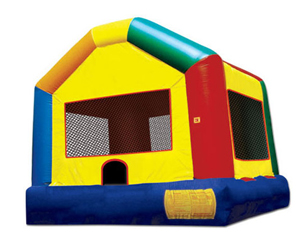 The winds that lifted three inflatable bounce houses and injured 13 people in New York this weekend have put the focus on amusement ride safety as summer begins.
The winds that lifted three inflatable bounce houses and injured 13 people in New York this weekend have put the focus on amusement ride safety as summer begins.
A gust of wind picked up the inflatable bounce houses with children playing inside in Oceanside on Long Island. Parents and bystanders ran after the inflatable houses, trying to pin them to the ground but were knocked over. Eventually the houses came to the ground on their own.
Adults and children were transported to the hospital, but no one was seriously injured.
The incident follows two similar situations in Arizona. In February, an inflatable bounce house blew over a fence and onto a roof with two girls inside. One girl was seriously injured while the other suffered minor injuries. In April, four children were injured when the inflatable jumping castle they were playing in lifted up in a dust devil. The inflatable castle blew across a busy Tucson highway and landed in the median.
In March 2010, a five-year-old boy died after falling from an inflatable ride at a Wichita, Kansas entertainment complex.
The Consumer Product Safety Commission reports that between 2003 and 2007, 31,069 people went to the emergency room after being injured on inflatable amusement rides, including bounce houses and slides. Of these, 85 percent of those injured were under the age of 15. Injuries often occur when inflatables get unhinged or there are users of different sizes.
Amusement rides and backyard toys are a staple of summer, but have come under scrutiny for their safety risks in recent years. In 2004, a 38-year-old man was killed on an amusement park ride at a Shrewsbury, Massachusetts church fair. Two other people suffered personal injuries.
The Massachusetts Department of Public Safety investigated the amusement ride death and found that the man’s lap restraint was defective. The state found other riders had complained about the restraint in the days prior to the death.
The state faulted the ride’s operator, Jaro Amusements, for not keeping proper maintenance records. The employee who supervised the ride was charged with manslaughter and received 2 1/2 years probation. The victim’s family filed a wrongful death lawsuit against Jaro Amusements, the supervisor and other parties.
What to Know About Amusement Park Safety
- All amusement park rides must be inspected annually.
- Do not visit amusement parks or use inflatable rides in windy or rainy weather.
- When waiting in line for a ride, check the equipment. Are riders wearing seat belts and other safety equipment? Listen to people exiting the ride to hear if they complain about the equipment. If you have a bad feeling, step out of line.
- Amusement riders have a responsibility to exercise good judgment. This means obeying verbal instructions and warnings from ride operators, not riding under the influence of alcohol and drugs and not disabling safety devices.
- If you are injured on an amusement ride, the operator must report it to the state Department of Public Health. This includes injuries caused by small rented inflatable rides used at backyard birthday parties and other events.
What to Know About Rented Inflatable Amusement Rides
- If you are renting an inflatable device or other amusement ride, ask the owner when it was last inspected.
- Carefully inspect the rented piece of equipment for excessively worn and damaged materials. Do not accept it in poor condition.
- Listen carefully to the set-up instructions provided by the company renting the device.
- Limit the number of users at one time to avoid injuries.
What to Know About Backyard Trampoline Safety
Backyard trampolines may look fun, but they come with dangers. In 2008, trampoline injuries sent an estimated 100,000 victims to emergency rooms with serious injuries such as spinal cord injuries, broken bones and head injuries. In some cases, victims have been permanently paralyzed.
- Never let children jump on the trampoline without adult supervision.
- Children under the age of 6 should never use a trampoline. The journal Pediatrics calls children this age “top-heavy” and said when they fall on trampolines, they often suffer head injuries.
- Only one person should jump at a time.
- Do not allow flips or somersaults. The Consumer Product Safety Commission reports this is one of the leading causes of trampoline injuries.
- Install safety netting around the trampoline, but advise users the netting does not mean they can do flips or other unsafe maneuvers. Carefully explain they cannot bounce off it in any way.
- Cover the trampoline’s steel rim and springs with a safety pad so users do not fall through the openings. Do not allow people to sit on the safety pad.
- Users should step onto the trampoline and step off. They should never jump off. This could lead to trampoline accidents.
- Follow the manufacturer’s recommendations for when to replace parts. Different parts have different lifespans and failure to replace could result in serious personal injury.
Youth Bicycle Helmets Recalled
 Parents are advised to check their children’s bicycle helmets after a widespread recall involving popular models sold at Walmart and Amazon.com. The recall may affect families and cyclists in Massachusetts.
Parents are advised to check their children’s bicycle helmets after a widespread recall involving popular models sold at Walmart and Amazon.com. The recall may affect families and cyclists in Massachusetts.
Bell Sports of Scotts Valley, California is recalling 33,600 of its Bell Exodus full-face helmets with a plastic buckle on the chinstrap. The defective bike helmets have an angled visor and came in multiple colors in youth size. They were sold at Walmart stores and Amazon.com for $50 to $60 between August 2009 and March 2011.
The helmets pose a head injury hazard in the event of bike accident. The plastic buckle that connects the chin straps can fail and cause the helmet to fall off the person’s head, leaving them unprotected in bicycle accidents. The company has received one report of a buckle failing, resulting in a personal injury that required facial stitches.
Some 31,100 of the defective bike helmets were sold across Massachusetts and the United States. Another 2,500 helmets were sold in Canada.
Consumers are advised to stop using the helmets immediately. Read about the bike helmet recall on the Consumer Reports website. You will find a list of model numbers.
Contact Bell Sports if you have a defective helmet and request a free replacement. Call Bell Sports toll-free at 866-892-6059 between 8 a.m. and 5 p.m. CT Monday through Friday.
If you are a cyclist, wearing a helmet is critical to reducing the risk of head injuries. It is also critical for your children. It is important to purchase a helmet which is safe for use, meets CPSC standards and to learn how to properly fit your helmet. To learn more, read this brochure from the NHTSA – and share it with your friends and family members who ride.
Another important safety tip is to replace your helmet regularly. We hope you never fall or are injured in a bicycle crash, but if you do fall, your helmet should be able to absorb the fall and provide protection. Once a helmet hits the ground in a crash, it should be replaced right away. If you don’t crash, you maybe able to use your helmet for a few years. You have to carefully inspect your helmet, evaluate the condition of the helmet and the wear and tear on helmet straps. Some people should replace helmets every year and others may work for two or three years.
In Massachusetts, cyclists who are 16 and younger are required by law to wear bicycle helmets. Bike share programs in the Boston area typically have language in their rider contracts, requiring cyclists to wear helmets at all times. Wearing a bicycle helmet is a step every cyclist can take to protect themselves, so we hope you and your family take time to purchase helmets and commit to wearing them. Read More
One Million Pool Drain Covers Recalled As Summer Begins
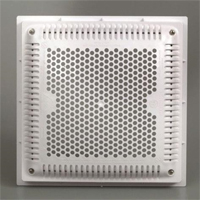 One million defective pool and spa drain covers are being recalled because they are incorrectly rated to handle the flow of water and pose a possible entrapment hazard.
One million defective pool and spa drain covers are being recalled because they are incorrectly rated to handle the flow of water and pose a possible entrapment hazard.
No injuries have been reported. The safety drain covers are being voluntarily recalled by eight manufacturers and are not sold directly to consumers.
There are 6.2 million residential and public inground pools and inground spas in the United States and the pool drain cover recall affects fewer than 5 percent, according to the Consumer Product Safety Commission (CPSC). But the recall comes just a few weeks before schools in Massachusetts finish for the summer and it is unclear how many closures it may force among the state’s public swimming pools.
The federal Virginia Graeme Baker Pool and Spa Safety Act took effect December 19, 2008, tightening safety standards for drain covers sold to consumers and public pool operators. The recalled drain covers were installed after that, between December 19, 2008 and April 2011.
The new legislation has been credited with reducing fatal drownings and pool accidents caused by unsafe suctions. From 1999 to 2008, 12 people were killed in pool and spa entrapments and 72 suffered injuries, according to the CPSC. In 2009 and 2010, there were no deaths and 10 pool entrapment injuries reported.
The affected drain covers were sold through independent distributors to pool and spa builders and installers. The CPSC is advising consumers to contact their pool builder or pool service provider. Consumers can also visit the Drain Cover Recall web page maintained by The Association of Pool & Spa Professionals or call the association at 866-478-3521.
The manufacturers and pool service professionals will replace or retrofit the defective pool drain covers at no charge to consumers.
Consumers are advised not to use pools with the defective drain covers and not to attempt to replace the drain covers themselves.
The manufacturers involved in the pool drain cover recall are A&A Manufacturing of Phoenix, Arizona; AquaStar Pool Products Inc of San Diego; California, Color Match Pool Fittings of Surprise, Arizona; Custom Molded Products of Tyrone, Georgia; Hayward Pool Products of Elizabeth, New Jersey; Pentair Water Pool and Spa of Sanford, North Carolina; Rising Dragon USA, of E. Sweetwater, Tennessee and Waterway Plastics of Oxnard, California.
For more information on the recall, click here.
Read More
Massachusetts Supreme Judicial Court Denies General Contractor Immunity
Ruling Confirms Rights of Injured Workers to Bring Third Party Claims Against General Contractor after Receiving Workers’ Compensation Insurance
The Supreme Judicial Court (SJC) today affirmed the right of an employee of an uninsured subcontractor to bring third party claims against the general contractor, even if the general contractor has made workers’ compensation payments pursuant to G.L. c. 152, § 18. The case was an important victory for workers injured in construction accidents.
The case arose from an explosion on a residential construction site. The explosion killed a worker and seriously injured his son, who was also working at the site. Both men were employed by Great Green Barrier Co., which did not have workers’ compensation insurance. As a result, pursuant to G.L. c. 152, § 18, the general contractor, Henry C. Becker Custom Building Ltd., was liable for the workers’ compensation obligations. This obligation arises under the policy in Massachusetts that a general contractor is responsible to hire only subcontractors which have workers’ compensation insurance available for their employees.
The defendant argued that the statutory scheme prevented the plaintiffs from making third party claims once they had accepted lump sum workers’ compensation settlements pursuant to G.L. c. 152, § 23, which ordinarily bars workers from maintaining negligence claims against their employers if they have accepted workers’ compensation benefits. While this argument had persuaded the trial court, which granted summary judgment for the defendant, the ruling had been overturned by the Appeals Court. Wentworth v. Henry C. Becker Custom Bldg. Ltd, 76 Mass.App.Ct. 507 (2010).
The SJC granted further appellate review and affirmed the Appeals Court ruling, which reversed the summary judgment for the defendant.
Click here for more information on this case.
Read More
Drive Safely This Memorial Day Weekend
As 35 million Americans plan to travel this Memorial Day weekend, we urge drivers in Massachusetts and throughout New England to think safety.
Travel will be down 100,000 travelers from 2010, which saw a 14 percent increase from the year before, according to the auto club AAA. Approximately 30.9 million people plan to drive 50 miles or more to their Memorial Day destination.
When this many drivers are on the road, it is especially important to watch out for those around you to avoid traffic accidents. That includes pedestrians, bicyclists and motorcyclists as well as other cars. Here are some things to remember while traveling this holiday weekend:
- Wear seatbelts and make sure everyone in the car does the same. It is the law in Massachusetts and has proven effective in preventing traffic fatalities. In 2008 alone, seat belts saved more than 13,000 lives nationwide, according to the National Highway Traffic Safety Administration (NHTSA).
- If you are traveling with children, make sure child passenger seats are in compliance with the law. Passenger seats can save lives in motor vehicle accidents. Click here to learn about Massachusetts’ child passenger seat law.
- When the roads are congested, watch out for aggressive drivers. Aggressive driving behavior may include someone who is following you too closely, speeding or gesturing at you. Avoid eye contact. Do not gesture back. Make it your goal to move away from the driver and not be involved in an aggressive driving car accident. If you can get the driver’s license plate, report the driver to authorities when it is safe to do so.
- Avoid driving fatigue. Do not drive if you have had inadequate sleep, worked an excessive number of hours or late at night without proper rest.
- Give motorcyclists more distance – three or four seconds – when following from behind to prevent a motorcycle accident. The goal is to give the motorcyclist enough time to make decisions and stop quickly if needed.
- Be aware that a motorcycle’s flashing turn signal can be deceptive. The signal may not be self-canceling and a motorcyclist may forget to turn it off. Wait to see whether the rider actually turns or a motorcycle accident may result.
- Allow bicyclists 3 feet clearance when passing on the road.
- Yield to cyclists at intersections and traffic signals before making your own driving decisions.
- Watch out for pedestrians and runners even in areas you may not expect them. In 2009, pedestrian deaths accounted for 12 percent of all traffic fatalities.
- Be vigilant about not driving while distracted and not texting while driving. It may be easy to let your guard down when you are relaxing among friends and family. But motor vehicle accidents happen fast and it is best to focus on the road.
- If you are drinking alcohol, do not drive, bicycle or walk on the road.

